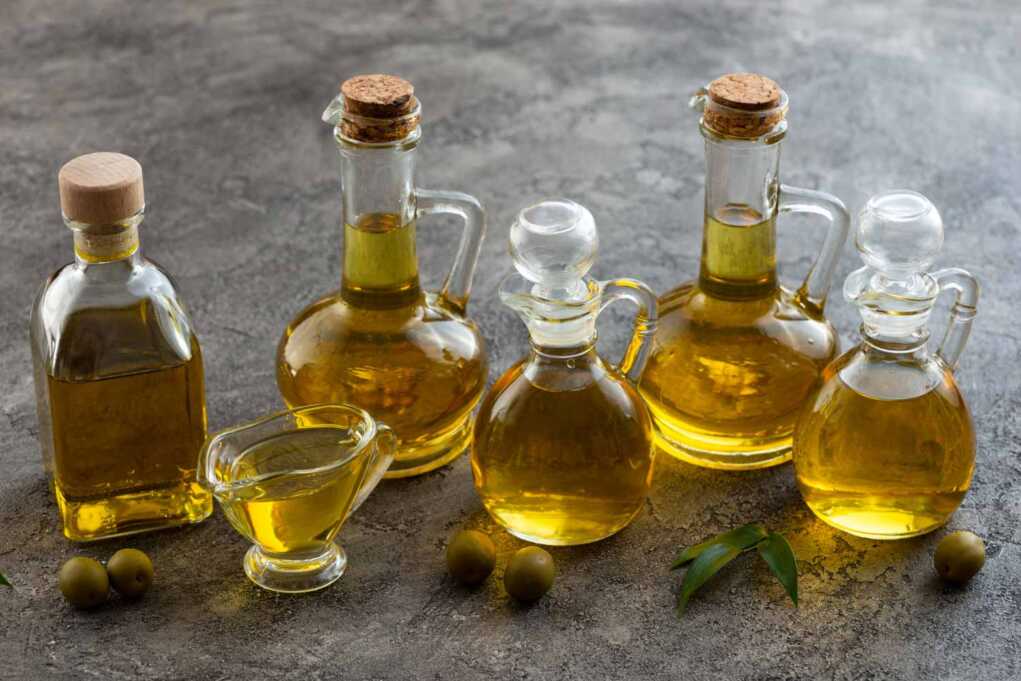
What Is Olive Oil?
Olive oil is the liquid fat, or natural oil, obtained by pressing whole olives. The fruit, from a tree native to the Mediterranean, has a unique flavour that’s dependent on its country of origin – some mild, others peppery or even bitter. Processing techniques result in olive oils of different ‘grades’, either refined and unrefined. Unrefined oils are pure and untreated, meaning no heat or chemicals have been used in the extraction process. This produces a purer oil with stronger taste. Refined oils have been treated to remove any flaws, and are usually lighter in colour and milder in taste.
Is Extra Virgin Olive Oil Good For You?
Extra virgin olive oil (EVOO) is an unrefined oil made from the first ‘virgin’ press of the fruit. No heat is used in the extraction process, preserving beneficial plant compounds called polyphenols. Deemed the highest quality, you can expect to pay more for EVOO. It also has a stronger flavour and is darker in colour. Regular or light olive oils are typically a blend of both cold-pressed and refined oils.
Read on to discover the health benefits of olive oil:
- it’s rich in mono-unsaturated fats
- it may be protective against chronic disease
- it has anti-inflammatory properties
- may help manage body-fat composition
- may improve heart health
- may improve blood pressure
- may help manage cholesterol
- may reduce the risk of stroke
- may lift mood
- may improve brain function
Nutritional Profile Of Olive Oil
One 1 level tbsp (11ml) serving provides:
- 99 kcals / 407 kJ
- 11g fat
- 6g saturates
- 0g monounsaturates
- 9g polyunsaturates
- 56mg vitamin E
What Are The Top 10 Health Benefits Of Olive Oil?
-
Rich in mono-unsaturated fat
Of the fats in olive oil, the predominant is a type known as mono-unsaturated fatty acids (MUFA), this fat has only one (mono) double bond as opposed to many (poly) which makes it more resistant to the changes incurred when heated. In fact, oleic acid the predominant MUFA found in olive oil is thought to be 50 times less likely to oxidise (combine with oxygen) than linoleic acid, the predominant fat found in poly-unsaturated (PUFA) vegetable oils like sunflower and corn oil.
-
May have protective properties against chronic disease
Olive oil, and most notably EVOO, are rich in at least 30 plant defence chemicals called polyphenols, one of which is called oleocanthal. The oil is also a useful source of protective nutrients like vitamin E. These compounds and nutrients are thought to be beneficial in protecting against chronic disease including heart disease and certain cancers.
-
Has useful anti-inflammatory properties
Inflammation is thought to be one of the key drivers behind some of our most chronic health problems, including Alzheimer’s and type 2 diabetes. Research looking at the role of antioxidants and their anti-inflammatory effect, including oleic acid found in olive oil, has discovered that these play a role in reducing inflammation and the marker for inflammation, known as C-reactive protein (CRP).
Of particular note, oleocanthal in olive oil appears to share the same pharmalogical activity as ibuprofen, and acts as a natural anti-inflammatory. Interestingly, this useful property has been associated with positive changes in those with rheumatoid arthritis.
-
May help manage body-fat composition
Studies suggest consuming a MUFA-rich diet prevents the accumulation of central body fat and potentially improves insulin sensitivity.
Central body fat is strongly associated with obesity-related illness including insulin resistance and type 2 diabetes.
-
May improve heart health
Olive oil is a key component of the Mediterranean diet, along-with a high consumption of water, fruit, nuts, vegetables, whole-grains and a moderate intake of dairy, fish, red wine and lower amounts of red meat and processed foods. Research suggests this pattern of eating may have benefits for health including that of the heart. EVOO is thought to be especially helpful in this regard.
-
May improve blood pressure
A Mediterranean diet that includes olive oil is associated with improvements in blood pressure. A study evaluating a diet rich in PUFA fats versus MUFA, such as olive oil, suggested the improvements in blood pressure seen in the MUFA group may be due to an enhanced relaxation of the blood vessels that was stimulated by the polyphenols in olive oil.
-
May help manage cholesterol
Consuming olive oil may improve cholesterol levels. The beneficial effects may be due to the protective effects of the oil’s polyphenols, combined with the fact that the high levels of oleic acid are less prone to oxidative damage.
8.May reduce the risk of stroke
A large review of studies demonstrated that olive oil was the only source of MUFA fats that was associated with not only a reduced risk of heart disease but also of stroke.
-
May lift mood
As part of a healthy diet that includes a high intake of fruit, vegetables, wholegrains and oily fish, olive oil may play a role in reducing the risk of depression. A more recent study suggests beneficial effects of EVOO on severe depression as opposed to mild to moderate forms of the condition.
-
May improve brain function
A 2015 study found that in older populations, a Mediterranean diet supplemented with olive oil or nuts was associated with improved cognitive function, when compared to a low-fat diet.
Is Olive Oil Safe For Everyone?
A dietary staple for many of the world’s healthiest populations, olive oil is considered a good choice for the majority of people. That said, rare reports of allergy have been recorded, although these are typically to the pollen of the olive tree rather than the oil of the fruit.
Being calorie-dense, olive oil’s use should be moderated, with it being chosen as a replacement for other fats used in the diet.
Should I Include Olive Oil In My Diet?
Yes, included as a component of a healthy, balanced diet, olive oil can make a valuable contribution to maintaining health. This is thanks to its high MUFA content and the polyphenols which are especially rich in EVOO.
If you are considering any significant changes to your diet, please consult your GP to ensure you can do so without risk to health. This is especially relevant if you have been diagnosed with a specific health condition or are on medication.
Important Notice: This article was originally published at www.bbcgoodfood.com by Nicola Shubrook – Registered nutritionist where all credits are due. This article was reviewed by Kerry Torrens.
Disclaimer
The watching, interacting, and participation of any kind with anything on this page does not constitute or initiate a doctor-patient relationship with Dr. Farrah™. None of the statements here have been evaluated by the Food and Drug Administration (FDA). The products of Dr. Farrah™ are not intended to diagnose, treat, cure, or prevent any disease. The information being provided should only be considered for education and entertainment purposes only. If you feel that anything you see or hear may be of value to you on this page or on any other medium of any kind associated with, showing, or quoting anything relating to Dr. Farrah™ in any way at any time, you are encouraged to and agree to consult with a licensed healthcare professional in your area to discuss it. If you feel that you’re having a healthcare emergency, seek medical attention immediately. The views expressed here are simply either the views and opinions of Dr. Farrah™ or others appearing and are protected under the first amendment.
Dr. Farrah™ is a highly experienced Licensed Medical Doctor certified in evidence-based clinical nutrition, not some enthusiast, formulator, or medium promoting the wild and unrestrained use of nutrition products for health issues without clinical experience and scientific evidence of therapeutic benefit. Dr. Farrah™ has personally and keenly studied everything she recommends, and more importantly, she’s closely observed the reactions and results in a clinical setting countless times over the course of her career involving the treatment of over 150,000 patients.
Dr. Farrah™ promotes evidence-based natural approaches to health, which means integrating her individual scientific and clinical expertise with the best available external clinical evidence from systematic research. By individual clinical expertise, I refer to the proficiency and judgment that individual clinicians acquire through clinical experience and clinical practice.
Dr. Farrah™ does not make any representation or warranties with respect to the accuracy, applicability, fitness, or completeness of any multimedia content provided. Dr. Farrah™ does not warrant the performance, effectiveness, or applicability of any sites listed, linked, or referenced to, in, or by any multimedia content.
To be clear, the multimedia content is not intended to be a substitute for professional medical advice, diagnosis, or treatment. Always seek the advice of your physician or other qualified health providers with any questions you may have regarding a medical condition. Never disregard professional medical advice or delay in seeking it because of something you have read or seen in any website, video, image, or media of any kind. Dr. Farrah™ hereby disclaims any and all liability to any party for any direct, indirect, implied, punitive, special, incidental, or other consequential damages arising directly or indirectly from any use of the content, which is provided as is, and without warranties.








